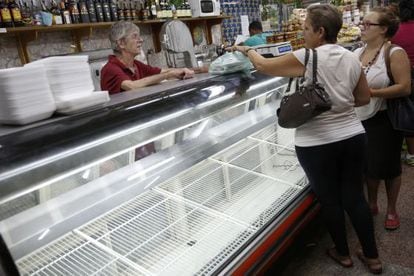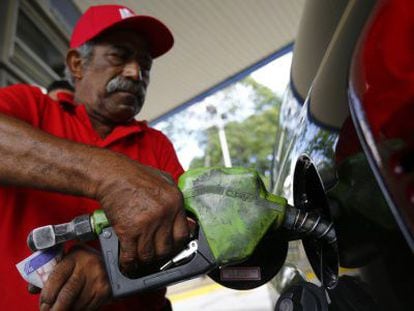Venezuela on the verge of default
Investors and experts question the country’s ability to meet its $6 billion sovereign debt obligations

“We are going to pay the amount due in the next few weeks. We have the fortitude and capacity to continue to fully meet our international obligations this year,” President Nicolás Maduro said during a meeting with his economic team in Caracas last week. Although the statement was applauded, there are reasons to question whether Venezuela has the resources to pay.
The country must come up with $6 billion to cover its sovereign debt and loans owed through the state oil company, Petróleos de Venezuela (Pdvsa), this October. Since taking office in February 1999, the Bolivarian Revolution has made punctual payments on its debts. But now that the government holds an unbalanced balance sheet, there is reasonable doubt as to whether Venezuela – the country with the largest crude oil reserves on the planet and more than $100 billion in oil exports on average every year – has enough resources to meet its obligations.
“I do not believe they have them but I do believe they will pay. That’s why they’re rushing to sell Citgo,” says José Guerra, a well-known economist and former research chief at Central Bank of Venezuela (BCV) for many years. Citgo is a Pdvsa subsidiary and US-based oil refinery network that includes three plants and 6,000 gas stations. International media outlets have said the government put the network up for sale to the highest bidder. “They are willing to make any sacrifice in order to pay,” Guerra says.
Last week’s announcement has not dissipated doubts about Venezuela’s solvency. In fact, the financial markets punished Venezuelan bonds, and they experienced their worst rout on the New York Stock Exchange in a year. The bonds made a slight recovery on Tuesday. Still, investors are not sure Venezuela will pay. Maduro’s 16 months in office have coincided with a 10-percent loss for Venezuelan bondholders.
If Venezuela defaults, the situation will be worse than Argentina’s”
Economist José Guerra
Meanwhile, two Venezuelan economists at Harvard University, Miguel Ángel Santos and Ricardo Hausmann, ex-minister in Carlos Andrés Pérez’s Social Democratic administration between 1989 and 1992, dared to utter the unmentionable. In a column published last Friday on Project Syndicate, they not only fed the doubts about Venezuela’s ability to meet its obligations but they also gave a moral outlook on the situation the chavista regime faces: “The fact that his administration has chosen to default on 30 million Venezuelans, rather than on Wall Street, is not a sign of its moral rectitude. It is a signal of its moral bankruptcy.”
Venezuela is experiencing a severe shortage of consumer goods. The government owes $4 billion to international airlines – a situation that could leave the country without airline service and thus isolate the nation. Unpaid invoices for $150 million in foreign currency purchases have made it impossible to import printing paper and newspapers have closed or reduced their distribution. Billion-dollar debts to pharmaceuticals, automakers and food producers, among others, have led to a shortage of goods on the domestic market. In light of this selective default in trade which affects the ordinary citizen, Hausmann and Santos ask, should Venezuela default on its foreign bonds?
The financial sector quickly reacted to the situation. A Venezuelan-born analyst at Bank of America, Francisco Rodríguez, hurried to say that “Venezuela has foreign income streams to satisfy its need for imports and to meet its international obligations.”
“Default is a big word,” José Guerra said. “If Venezuela defaults, the situation will be worse than Argentina’s because Argentina has the means to subsist and Venezuela does not.” The most reasonable way forward would be for the country to restructure its debt but the Maduro administration refuses because it wants to avoid negotiating with the demonized multilateral organizations and protect itself from high interest rates that the market would impose on its new bonds.
Translation: Dyane Jean François
The highest inflation in the world
The economic woes of the Venezuelan people continue. On Tuesday, the Central Bank of Venezuela (BCV) announced official inflation rates. Although this data was questioned by a number of economists who commented on the news on social media platforms, the government said the Consumer Price Index (CPI) reached 63.4 percent between August 2013 and August 2014, making Venezuela the country with the highest rate of inflation in the world, bordering on hyperinflation. A year ago, that number was at 45.4 percent. But, inflation grew by 39 percent in 2014. BCV said the index only grew by 3.9 percent in August and that the market was showing a downward trend for the third consecutive month given that it only grew by 4.4 percent in June and by 4.1 percent in July. Still, the rate of inflation has increased over the last six months.
Experts are convinced that if the government had not changed the methodology for CPI calculations, the annual rate would have surpassed 75 percent. They say it will be around 70 percent by the end of this year.
According to BCV’s official report, which the Venezuelan government oversees, these inflation rates are due to “the political conflicts caused by the economic war that disrupted the normal flow of productive activities and distribution of essential goods to meet Venezuelan demand.”
Maduro has blamed the protests that took place at the beginning of the year for the increase. According to the president, the barricades demonstrators built on the roads affected business and the violent skirmishes between the opposition and police forced shops to close early. Experts, however, say that excessive public spending, price controls, and controlled currency exchange rates are the real culprits.
Meanwhile, the government has taken some measures to halt inflation but to no avail. Maduro closed the Venezuelan-Colombian border at night to stop the flow of contraband goods such as foodstuffs and gas.
The most alarming figure in BCV’s report was the inflation rate on food. It had reached 99 percent by the end of August, basically climbing at rates that the country had only experienced during the financial crisis of 1994 and 1996.











































